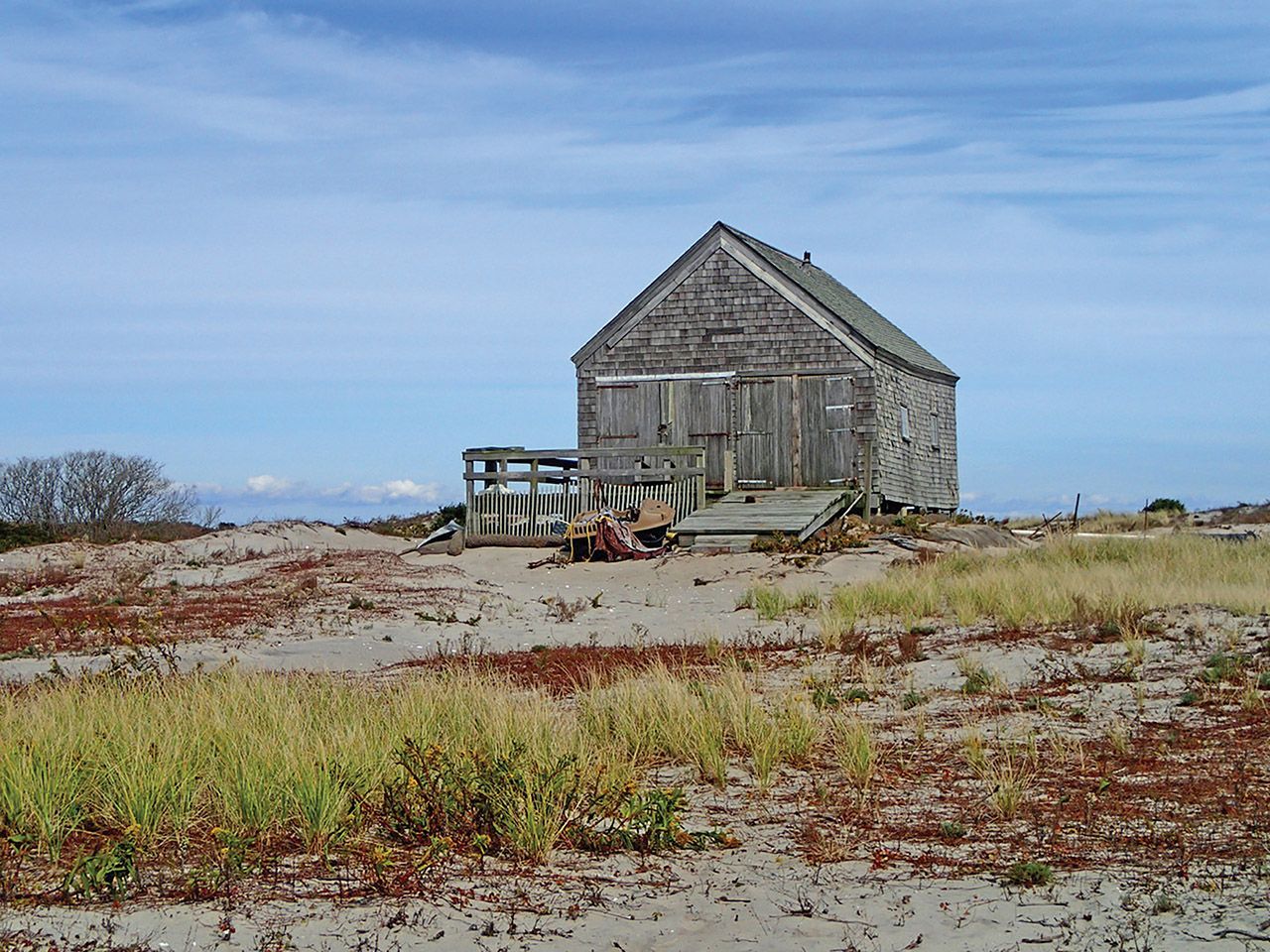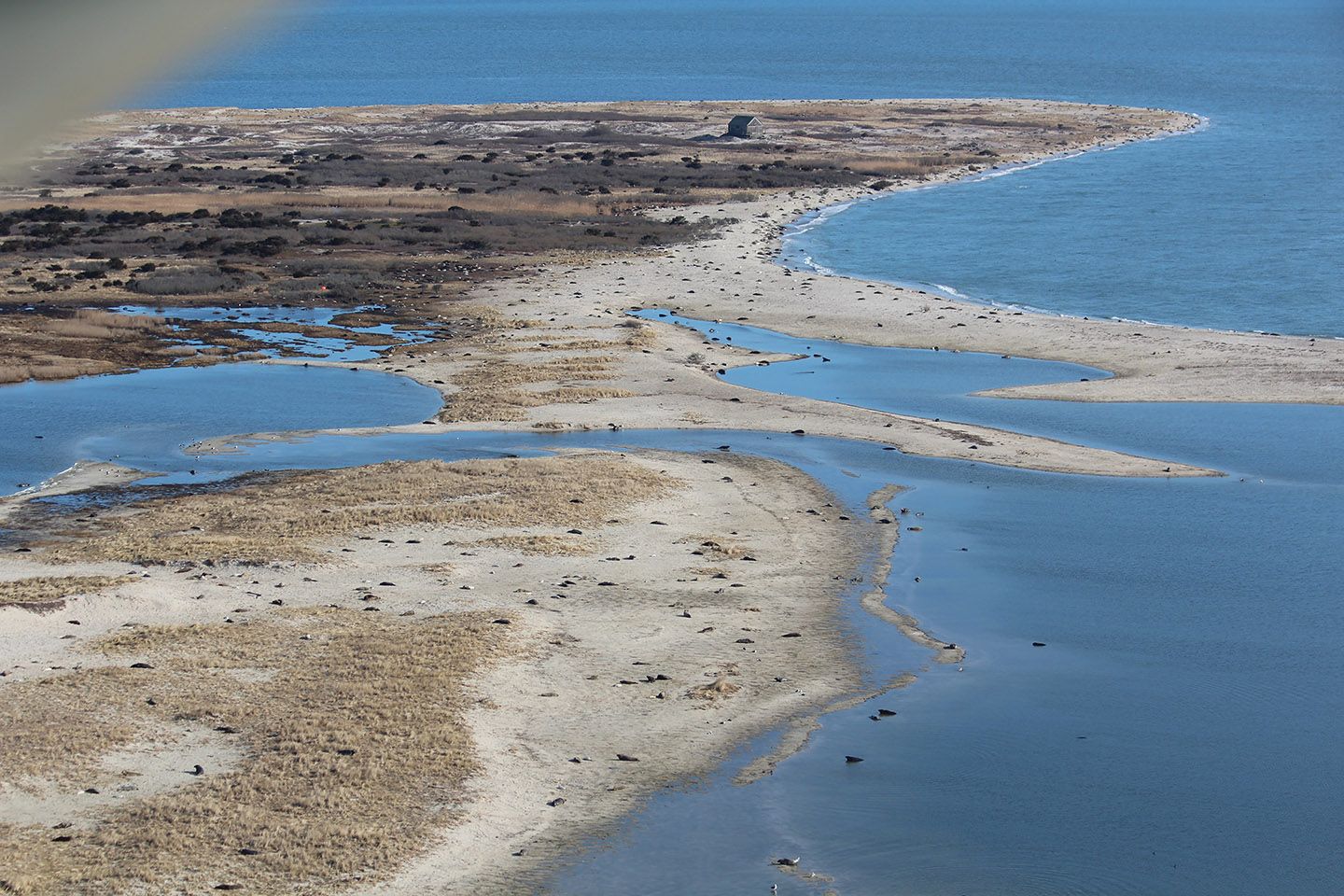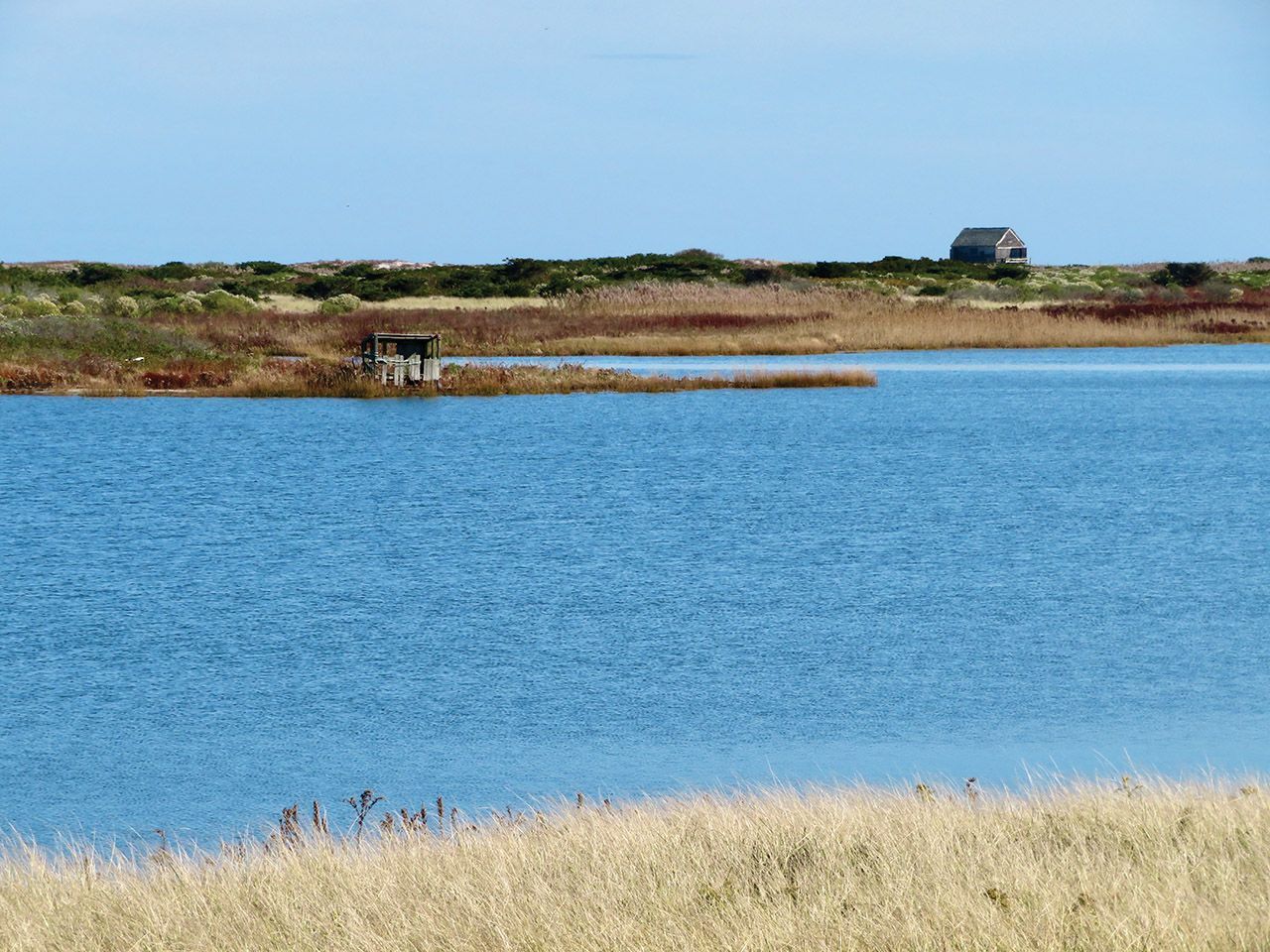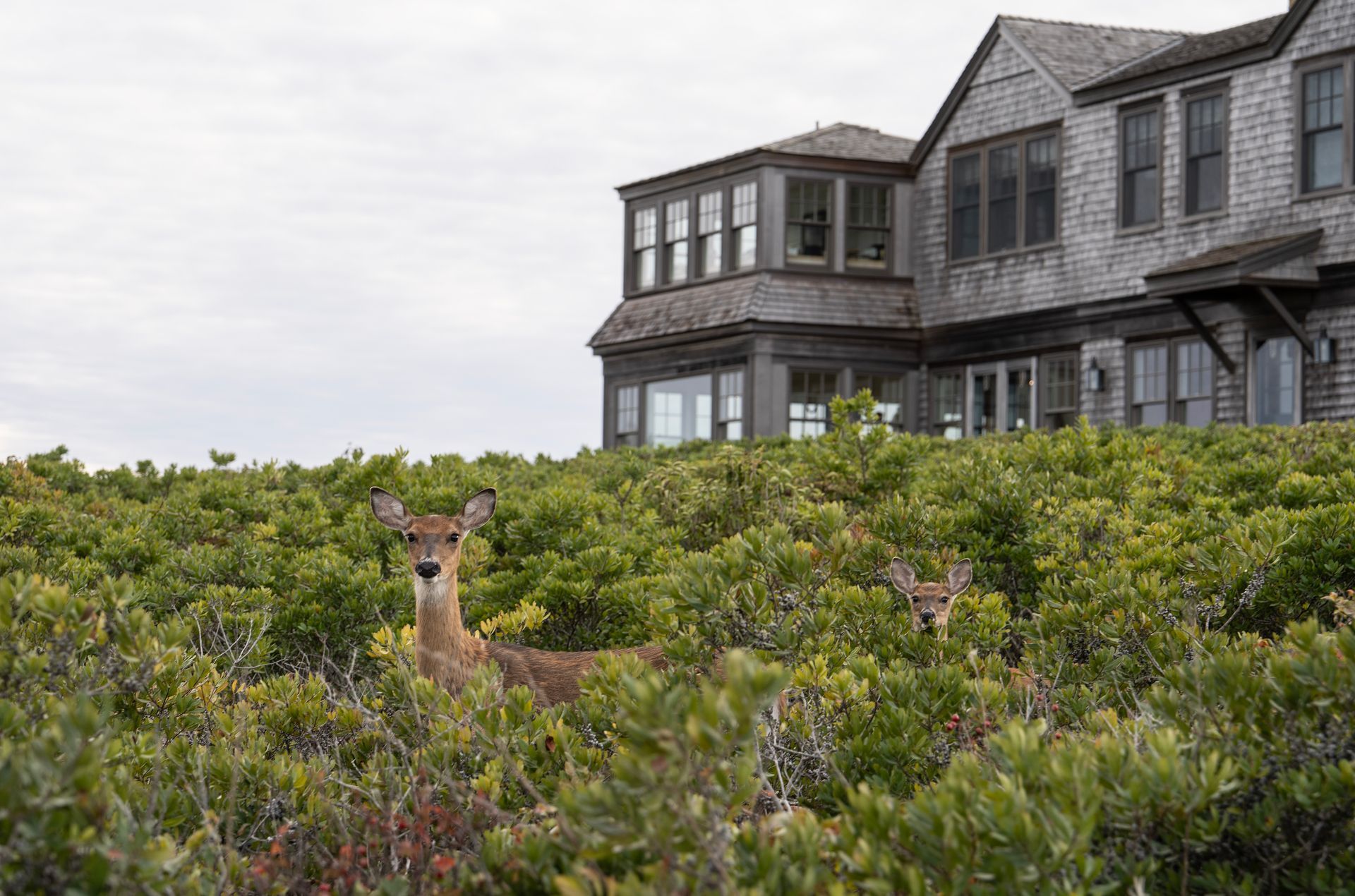Musings from Muskeget
Observations from Muskeget's only homeowner, Crocker Snow Jr.
HISTORY & POLITICS
story by Crocker Now Jr.
photography by Kit Noble and courtesy of Crocker Snow Jr.
No one really owns an island. No one living anyway. It is the spirits, ghosts and history that really own an island more than those breathing. I am fortunate enough to know one island very well, inside and out. The tiny, well-weathered uninhabited island of Muskeget is a smudge of treeless sand dunes just over the horizon 10 miles to the west of Nantucket’s shores. I was first exposed to it when I was 9 years old, and have been going there in all different seasons since. I pay real estate taxes too, though small due to the lack of town services. For Muskeget, it’s the past stories and the living species—seals, voles, seagulls, shore birds and close-by fish and shellfish—that truly own the island. It’s these for whom I and my family are committed to keeping the island “forever wild” as long as need be.

Both Muskeget and Nantucket are situated on the terminal moraine of the last ice age. Muskeget can see its lifetime in a mirror, moving, changing, getting smaller and anchored mostly now by poison ivy roots and dwarf cedar bushes. Its time is coming pretty soon. You could make the same case for Nantucket’s outlying parts, for Madaket and Siasconset and Coatue where the water-winds prevail and Mr. and Mrs. Erosion are the biggest taxpayers.

When you curl your toes in the shallows of Muskeget’s waters, you know it washes in from somewhere else and undertows elsewhere, off to some very far places. Surely there’s something of Nantucket somewhere on the rocky shores of other far-off islands: a bottle, a skeleton, driftwood from a
ship, even a washaway to tie their island stories.
Witness the rusty metal sign “Live Ammo: Be Aware” in Japanese characters and English that we found on a Muskeget beach in 1949, and because of the rough map diagrams on it, we concluded it drifted in the sea and icepack from the Aleutian Islands beyond Alaska. A well-known humpback whale named Pegasus who lived and was tracked in the Caribbean for most of her life and whose mass carcass we found in the summer of 1991 on the north beach of Muskeget qualifies. The small open boat that capsized between Muskeget and Tuckernuck a dozen years ago and was found on Spanish shores a year later also applies.
Recently, I journeyed far away from Muskeget and was exposed to another island on the other side of the world. One hundred miles southwest of the coast of South Korea is its largest island, Jeju. Think oval, think volcanic—the central volcano is called Hallasan. Think roughly the size of Manhattan with a big enough population of 650,000 inhabitants. Think geographically strategic. Think delicious fresh seafood, too. Though markedly different than Muskeget, and Nantucket for that matter, Jeju revealed some central characteristics that most islands share.
Like Nantucket, Jeju is very picturesque. Its people are cranky, purposeful and have an attitude of their own. Each island, and Muskeget even moreso, is engineered by the weather as much as the climate. Each is refreshed by onshore winds, of course, plentiful storms and fog. All three islands reflect the can do, can’t do, leave me alone but come on aboard stance that island folks around the world wear quite naturally. Each island has its dark history, too. For Nantucket, Herman Melville’s equally crazed captain and white whale tormenting each other stands out. Even though the fictional story’s duel to the death took place half a world away, Nantucket owns the story because their battle site, the Pequod, sailed from Nantucket, along with many of her crew.
Jeju’s dark history also involves bloodletting and is fact-based. It revolves around what was labeled an “uprising” during the post-World War II, pre-Korean War period of U.S. occupation with outbursts of fighting between islanders and outsiders about the island’s future political stance. An estimated 10,000 people were killed. A few skeletons are still being unearthed in remote volcanic caves. Muskeget’s most-told story is about a different type of spirit: more than 2,000 cases of Scotch whisky adrift after the shipwreck on nearby shoals in December 1924 of a rum-running schooner during the height of Prohibition. The seven crew members were all rescued and turned over to the authorities. The cases of whisky were saved too, taken by lifeboats to Muskeget for self-keeping. Their distribution was never fully recorded by the Coast Guard thereafter. The mystery prompted lots of newspaper articles, including one titled “Nantucket: 90 Proof,” but no reliable forensic evidence of what happened.
Among these island ghosts and spirits, it’s still the sea and seafood that forge the primary island ties and enrich its hardiest peoples who make their livelihoods catching, hauling and cleaning fish and shellfish for market. Nantucket counts its boatbuilders and whalers from lore, and its scallopers in open boats in the late fall and early winter days. Most all are fishermen, making a tough living on the water. Jeju’s most noted fisher people are all female, water women who free dive up to 60 feet and stay underwater for four minutes in summer and winter waters scouring the rough sea floor for prized abalone, octopus, sea urchins and particular seaweeds.

Called haenyeo, they are central to Jeju’s history. For many generations during the 20th century, they were the most prosperous and political group on the island, prompting what has been called a matrifocal society—a bit like Nantucket’s Quaker wives during the whaling years. At the height of things, there were 50,000 diving women in local collectives, and many traveled seasonally to more fertile water pastures at Vladivostok or the Japanese islands.
Today, an estimated 1,500 of them are still at it, still in collectives and selling their fares to many small eateries attracting visitors. As with Nantucket scallopers, their success depends not only on their fishing acumen but also on the speed they can shell, clean or cut their daily catch to sell ultra-fresh. For the record, Muskeget’s only prime fisher people today are the pods of big gray seals that consume up to 15 pounds of small fish and shellfish a day—and don’t share it. All three islands attract lots of attention from scientists, researchers and documentarians examining the prime, controlled, closed ecosystem at hand. Why is this species growing? Why no tern migration or eider ducks this year compared to last? How come this kill-off? Which disease or pathogen might be responsible, and might it spill over into the human chain? Is erosion the main cause or effect?
Most such island interns occupy their own silos of special interest. Some also ask if Darwin really missed something in the Galapagos, and is climate change accelerating things? One assumes that the tug of war between exposed wind and waters, the forces of typhoons, hurricanes and tidal waves as carriers of climate change, will ultimately determine these islands’ destinies. Probably so. But there’s another key tug of war that’s heating up: the growing tensions between preservation and development. Is Nantucket modernizing, building and sanitizing too much and losing its natural allure? Have the fast ferries become a curse? Which way should Jeju, suddenly overwhelmed with tourism (the one-hour Seoul-Jeju flight is thought to be the busiest in the world) and considering a second airport to facilitate it, turn? Are the haenyeo diving women, most of them over 50, under threat from being replaced by the young surfer crowd?
Muskeget doesn’t have these questions. It’s much too small and exposed. With only one camp shelter now standing, unlike Nantucket and Jeju, it’s only activity that’s still open for business is Nature itself.






